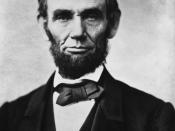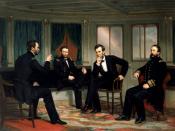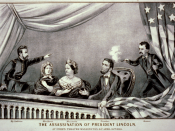8010886
"So powerful is the light of unity that it can illuminate the whole earth."-Baha'u'llah. In his Second Inaugural Address, Abraham Lincoln sincerely suggests that all humans are more similar than assumed in order to reveal the causes of the Civil War and to italicize the fact that the nation should unite as one.
The similarities of the North and South caused the war. Although both parties "deprecated" and "dreaded" war, one side "accepted" war while the other "made" war. Lincoln's use of parallelism emphasizes the similarities between both parties, which ultimately are proven to be the main cause of the war. Along with parallelism, anaphora also plays a large role within Lincoln's comparisons of the two parties. He often repeats words such as "both" and "neither," which again, emphasizes the fact that both parties do, indeed, have similarities. Because both sides are so similar, they fail to acknowledge the fact that war is not needed; the bitter feelings toward war in which they both possess are the very feelings that keep them at war.
The parties' comparisons create friction, which in turn "rends" them "by war." Lincoln appeals to authority by repeatedly referring to God. Lincoln suggests that the two sides are very similar because they both believe in the same higher power. Since both parties believe in the same higher power, it would be easier to come to an understanding, and hopefully, end the war. Lincoln's use of antithesis compares and contrasts the two parties' bitter feelings about war, and war itself. Their bitter feelings toward war created a war. Because the North and the South were so similar, it created friction, which was the main cause of the Civil War.
Regardless of similarities or differences, the nation should unite as one. The only way to "heal the...



Abraham Lincoln's Second Inaugural Address
This essay manages to clutter itself with a discussion of rhetoric so dense that there is no sense of what Lincoln did. Where is the context of the speech discussed? The writer apparently dismisses this as trivial, when in truth it is critical to any understanding of the address. The writer fails to give a sufficient description of the speech as a whole to give the reader a feel for the speech. It is perhaps the shortest inaugural address ever, but it is one of the most moving. This essay, by contrast, freezes.
1 out of 2 people found this comment useful.